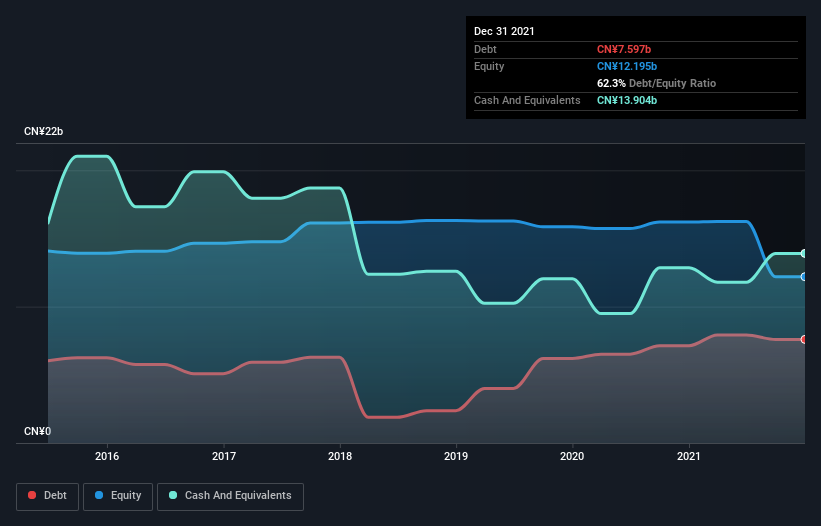
Howard Marks put it nicely when he said that, rather than worrying about share price volatility, 'The possibility of permanent loss is the risk I worry about... and every practical investor I know worries about.' When we think about how risky a company is, we always like to look at its use of debt, since debt overload can lead to ruin. Importantly, Harbin Electric Company Limited (HKG:1133) does carry debt. But is this debt a concern to shareholders?
What Risk Does Debt Bring?
Generally speaking, debt only becomes a real problem when a company can't easily pay it off, either by raising capital or with its own cash flow. Ultimately, if the company can't fulfill its legal obligations to repay debt, shareholders could walk away with nothing. However, a more usual (but still expensive) situation is where a company must dilute shareholders at a cheap share price simply to get debt under control. Of course, plenty of companies use debt to fund growth, without any negative consequences. When we think about a company's use of debt, we first look at cash and debt together.
Check out our latest analysis for Harbin Electric
What Is Harbin Electric's Net Debt?
The image below, which you can click on for greater detail, shows that at December 2021 Harbin Electric had debt of CN¥7.60b, up from CN¥7.13b in one year. However, its balance sheet shows it holds CN¥13.9b in cash, so it actually has CN¥6.31b net cash.

How Healthy Is Harbin Electric's Balance Sheet?
We can see from the most recent balance sheet that Harbin Electric had liabilities of CN¥44.5b falling due within a year, and liabilities of CN¥3.96b due beyond that. Offsetting these obligations, it had cash of CN¥13.9b as well as receivables valued at CN¥22.2b due within 12 months. So its liabilities total CN¥12.4b more than the combination of its cash and short-term receivables.
This deficit casts a shadow over the CN¥3.08b company, like a colossus towering over mere mortals. So we definitely think shareholders need to watch this one closely. After all, Harbin Electric would likely require a major re-capitalisation if it had to pay its creditors today. Harbin Electric boasts net cash, so it's fair to say it does not have a heavy debt load, even if it does have very significant liabilities, in total. The balance sheet is clearly the area to focus on when you are analysing debt. But ultimately the future profitability of the business will decide if Harbin Electric can strengthen its balance sheet over time. So if you're focused on the future you can check out this free report showing analyst profit forecasts.
In the last year Harbin Electric had a loss before interest and tax, and actually shrunk its revenue by 11%, to CN¥21b. We would much prefer see growth.
So How Risky Is Harbin Electric?
While Harbin Electric lost money on an earnings before interest and tax (EBIT) level, it actually generated positive free cash flow CN¥658m. So although it is loss-making, it doesn't seem to have too much near-term balance sheet risk, keeping in mind the net cash. Given the lack of transparency around future revenue (and cashflow), we're nervous about this one, until it makes its first big sales. To us, it is a high risk play. There's no doubt that we learn most about debt from the balance sheet. However, not all investment risk resides within the balance sheet - far from it. Be aware that Harbin Electric is showing 1 warning sign in our investment analysis , you should know about...
Of course, if you're the type of investor who prefers buying stocks without the burden of debt, then don't hesitate to discover our exclusive list of net cash growth stocks, today.
If you're looking to trade Harbin Electric, open an account with the lowest-cost platform trusted by professionals, Interactive Brokers.
With clients in over 200 countries and territories, and access to 160 markets, IBKR lets you trade stocks, options, futures, forex, bonds and funds from a single integrated account.
Enjoy no hidden fees, no account minimums, and FX conversion rates as low as 0.03%, far better than what most brokers offer.
Sponsored ContentValuation is complex, but we're here to simplify it.
Discover if Harbin Electric might be undervalued or overvalued with our detailed analysis, featuring fair value estimates, potential risks, dividends, insider trades, and its financial condition.
Access Free AnalysisHave feedback on this article? Concerned about the content? Get in touch with us directly. Alternatively, email editorial-team (at) simplywallst.com.
This article by Simply Wall St is general in nature. We provide commentary based on historical data and analyst forecasts only using an unbiased methodology and our articles are not intended to be financial advice. It does not constitute a recommendation to buy or sell any stock, and does not take account of your objectives, or your financial situation. We aim to bring you long-term focused analysis driven by fundamental data. Note that our analysis may not factor in the latest price-sensitive company announcements or qualitative material. Simply Wall St has no position in any stocks mentioned.
About SEHK:1133
Harbin Electric
Manufactures and sells power plant equipment in the People’s Republic of China, the rest of Asia, Africa, Europe, and the United States.
Solid track record with excellent balance sheet.
Similar Companies
Market Insights
Community Narratives



